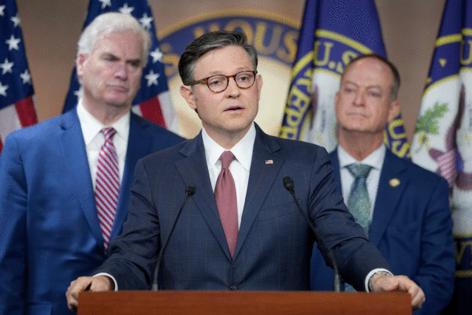House considers Trump cuts as Senate Republicans work on reconciliation bill
Published in Political News
WASHINGTON — As Senate committees continue to release their proposals for the House-passed reconciliation package this week, the House plans to vote on President Donald Trump’s proposals to rescind foreign aid and other spending, including for public broadcasting.
“The rescissions request sent to Congress by the Trump Administration takes the federal government in a new direction where we actually cut waste, fraud, and abuse and hold agencies accountable to the American people,” House Majority Leader Steve Scalise, R-La., said in a statement.
The path to House passage of the $9.4 billion package is still far from clear. Rep. Don Bacon, R-Neb., has already indicated he would vote against the package if it includes cuts to the George W. Bush-era program known as the President’s Emergency Plan for AIDS Relief, or PEPFAR, which provides foreign aid to fight HIV and AIDS.
“I just want to make sure we’re funding the medicine. We want to prevent AIDS, it’s a noble program, it’s George Bush’s legacy. I put the marker out there; we’ll see,” Bacon said in an interview with the New York Times.
The rescissions package could be just the first of several from Trump and his Office of Management and Budget.
The House also will take up bills this week targeting local operations in Washington, D.C.
One measure would bar noncitizens from voting in local elections in the District of Columbia. Another seeks to overturn a D.C. policing overhaul law.
While Republicans are often critical of public employee unions, police unions have long been an exception. Scalise’s office says the bill would restore “collective bargaining rights for MPD officers and a statute of limitations on disciplinary cases.”
Senate Republicans are still working behind the scenes to draft their version of the reconciliation bill. The Senate Banking, Housing and Urban Affairs Committee released its text last week. The draft would shut off the Consumer Financial Protection Bureau’s funding stream from the Federal Reserve.
The Senate process continues amid ongoing criticism from Elon Musk, the billionaire businessman who was until recently leading the White House office known as the Department of Government Efficiency, but who had a very public split from Trump over the last week.
Musk has come out against the House-passed reconciliation measure, criticizing the debt and deficit effects of the bill (while also predicting that Trump’s tariff agenda could lead to a recession in the back half of 2025).
But Speaker Mike Johnson, R-La., said the spat largely playing out on social media platforms was not spilling over to the Capitol phone lines.
“We’ve got almost no calls to the offices, any Republican member of Congress. And I think that indicates that people are taking a wait-and-see attitude,” Johnson said on ABC’s “This Week.”
The Senate is in the process of tweaking the product both to meet the needs of the chamber’s budgetary rules, as well as the interests of GOP senators.
Senate Democrats plan to keep up the criticisms of Republicans for potential cuts affecting health care services, including potential closures to rural hospitals.
While the background work is underway, the Senate starts the week with additional votes to confirm Trump nominees. Also still on the to-do list is the stablecoin regulation bill that has been pending business for weeks.
Committee work continues
Another digital asset regulatory measure is on the agenda for the House Financial Services Committee on Tuesday, with a new substitute amendment posted on Sunday. The committee plans to take up other bills, including housing legislation, at the same markup.
The headline committee action for the week is Tuesday’s kickoff of the regular appropriations markup process for fiscal 2026. The House Appropriations Committee on Tuesday will consider its subcommittee allocations, as well as the Military Construction-VA spending bill.
The full committee is scheduled to mark up the Agriculture spending bill on Wednesday, as well as both the Homeland Security bill and the Defense bill on Thursday.
Senate appropriators are continuing to hold subcommittee hearings this week. The agenda includes a Defense Appropriations Subcommittee hearing with Defense Secretary Pete Hegseth and Joint Chiefs of Staff Chairman Gen. Dan Caine scheduled to appear on Tuesday.
Former Senate Majority Leader Mitch McConnell, R-Ky., who chairs the Defense Subcommittee, has been a critic of Hegseth and voted against his confirmation. Also on the subcommittee are the other two Republicans who voted against Hegseth: Sen. Susan Collins of Maine, who chairs the full committee, and Sen. Lisa Murkowski of Alaska.
Another key hearing takes place Wednesday, when Treasury Secretary Scott Bessent scheduled to appear before the Financial Services Appropriations Subcommittee amid ongoing tax and trade debates, in which Bessent has emerged as a key negotiator.
©2025 CQ-Roll Call, Inc., All Rights Reserved. Visit cqrollcall.com. Distributed by Tribune Content Agency, LLC.

























































Comments